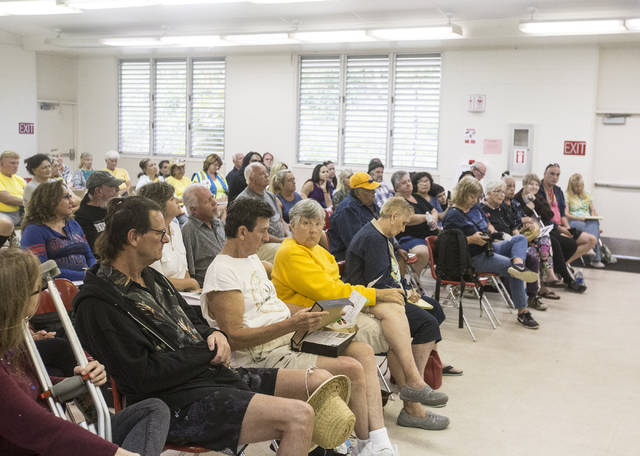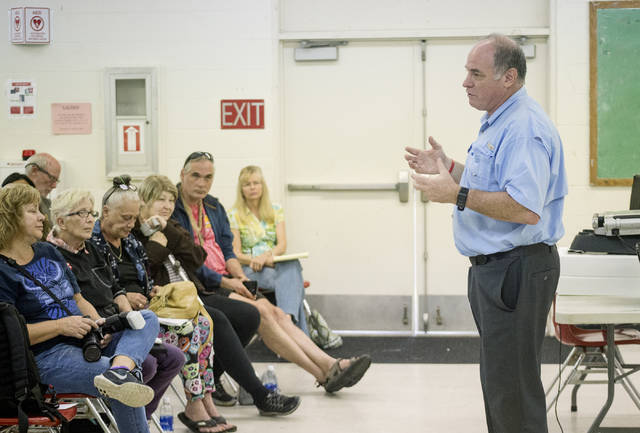Violent crime seemed to be on the minds of people who attended a forum Saturday on crime and drug abuse in Puna.
The host, state Rep. Joy San Buenaventura, a Puna Democrat, took written questions from the 50 or so in attendance at the Pahoa Neighborhood Center, and presented them to the speakers, who included county Prosecuting Attorney Mitch Roth, Puna Community Policing officers Davy Kamalii and Jeremy Kubojiri and Big Island Substance Abuse Council CEO Dr. Hannah Preston-Pita.
Question subjects included recent violent incidents in Puna, including a shooting and police standoff last month in Leilani Estates and a kidnapping Dec. 30 in Hawaiian Beaches.
In reply, Roth alluded to a news axiom: “If it bleeds, it leads.”
“Violent crime makes the front of the paper and that’s what you see. What are our levels of crime? Actually, our levels are … going down … according to the (state) attorney general,” Roth said.
Kamalii called the recent events “isolated incidents” and “not an everyday thing.”
“Those just happen to have occurred,” Kamalii said. “Is there an increase in crime? Our (statistics) in Puna shows that there’s a decrease in crime. Now these types of crime that show up in news and on the social media, etc., those just happened to occur and are isolated incidents. The hostage situation in Puna, … it started out as a domestic and led to something way larger than that.”
When noted by San Buenaventura that Puna has a limited number of officers to patrol an area roughly the size of Oahu, Kubojiri said, “It would be great if we had more police officers.”
The officers said citizens can request to be on the mailing list of an emailed newsletter with Puna crime statistics put out on a bi-weekly basis. Those interested can call the Pahoa police station at 965-2716.
“I hope it can help you guys better understand what is actually going on,” Kamalii said. “I wouldn’t necessarily rely on social media for your information. It can be both a positive and a negative.”
Roth mentioned the Big Island Thieves Facebook page.
“I love and hate that site at the same time,” he said. “The great thing that’s happening with Big Island Thieves is you have people who are talking to each other and things that are happening because they are talking to each other. The bad thing is there’s a lot of B.S. on there.
“The amazing thing is, you look at the people’s Facebook accounts and you look at Big Island Thieves and, ‘Hey, that’s the person they’re looking for!’”
A recent example is kidnapping suspect Joshua Sosa, scheduled for his initial court appearance today, and who apparently posted photos of himself making an obscene gesture in response to comments on the social media site.
Roth acknowledged that although overall crime figures are down, there was a spike in auto thefts in 2017.
“Those went up. We put some people in jail. We have a lot of people in jail right now for auto theft,” he said.
The prosecutor also noted the overcrowding at Hawaii Community Correctional Center in Hilo. The facility’s designed bed capacity is 206, the so-called operational bed capacity is 226 and the November incarceration report, the most recent available, listed 402 inmates.
“That’s a problem,” Roth said. “… A lot of people say, ‘How come (inmates) keep on getting released? Well, there’s no place to keep them. A lot of these people are pretrial (felony detainees). Very few misdemeanors or petty misdemeanors.”
Noting the presence of marijuana advocate Roger Christie, whose wife, Share, is in a federal prison for a marijuana offense and who was, himself, incarcerated by the feds in the same case, Roth asked attendees for the name of a single person currently doing time in a state jail or prison for a marijuana offense.
“I don’t know a single name. We have a room full of people; we have some marijuana advocates here. They don’t know a single name. You saw the paper. You saw the prosecutors have to decide. That’s not me; that’s the federal prosecutors,” Roth said, referring to U.S. Attorney Jeff Sessions’ recent announcement that he’ll leave it to federal prosecutors to decide whether to crack down in states where medical and/or recreational cannabis has been legalized. That’s a reversal of the Obama-era policy, in which the feds took a hands-off approach to marijuana dispensaries operating within the parameters of state law.
“I just want to make sure we have this clarity,” he added. “Do I, do we prosecute people for marijuana offenses? Occasionally, we do. My job is to enforce the laws as were written. Is that our main priority? It really isn’t.
“What really scares me right now isn’t marijuana. It is the opioid epidemic that’s hitting the rest of the United States. It has not hit us yet to the effect that it’s hitting other places. The state of Ohio last year had over 3,000 people that OD’d, died of opioids. There’s this thing out there called fentanyl. If you’re going to have an operation, they’re probably going to put fentanyl in your system. It’s the synthetic fentanyl that’s coming in from China and Mexico that people are overdosing and dying from.
“… These people are starting on heroin and getting into other opioids and fentanyl. We’re getting our heroin from the same places that a lot of people are getting it from. So it’s going to start hitting us.”
In response to a question from Roth, Preston-Pita said about 30 percent of BISAC’s 1,400 clients are being treated for opioid problems.
“That’s a scary number,” Roth said.
Email John Burnett at jburnett@hawaiitribune-herald.com.


